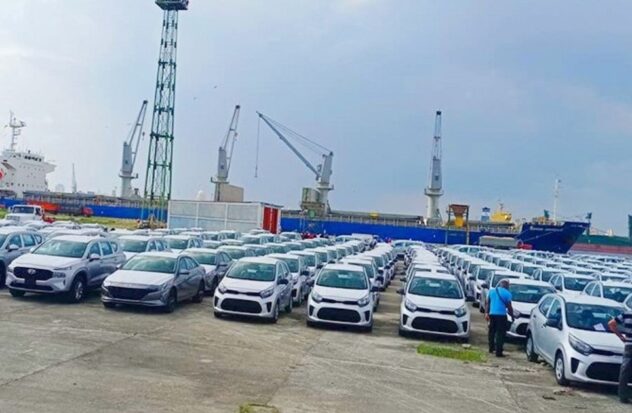That business, which has not stopped growing since the Joe Biden Administration gave it the green light in May 2022, and which has meant more than 30 million dollars in purchases in the past 15 months alone, seems to be flourishing thanks to the constant transfer of goods between the two countries, despite the embargo that the Cuban regime constantly complains about.
“But there is a business selling cars of all kinds in Cuba that rivals that of US exporters, and which is not run by a businessman close to the regime, like Hugo Cancio, and which does not acquire its vehicles through purchases in the northern neighbor. It is an automobile market managed by none other than the business conglomerate of the Cuban military, GAESA,” the portal reports. Cuba Diary.
Imported vehicles
Conveniently camouflaged within the Mariel Special Development Zone (ZEDM), Carroswwhich presents itself as “Imported Vehicles”, offers individuals and legal entities in Cuba an enviable assortment of new and certified used cars, which guarantees delivery within 15 days of the selected model, brought to the Island from Panama. Interested parties can purchase as many cars as they wish.
Carrosw Its catalogue includes buses and trucks, light and heavy equipment, motorcycles and their parts, as well as gasoline and hybrid SUVs, with a range of brands such as Chevrolet, Toyota, Kia, Nissan, Hyundai, Suzuki, Ford, Lexus, BMW, Cadillac, Lincoln, Peugeot, Renault, Volvo, Audi, totaling 42.
Out of pure curiosity, I checked the assortment of Porsche cars, some of the most expensive in the catalog, and found 13 models available. Among them, a new 2024 Taycan Turbo S stands out for $251,747, and another 2020 911 Carrera S, with 10,000 kilometers, for $173,351.
As for Chevrolets, there are 38 models on sale, all new. Among them are a seven-passenger 2024 Suburban gasoline model ($96,282); an N400 minibus ($23,900); a Silverado ZR2 pickup truck ($82,608), and even three Corvettes ($187,956-$207,959).
Interested parties can filter the vehicle of their choice on the business’ website by brand, year, mileage and fuel type, among other features, and reserve it with a $1,000 deposit paid online, which will then be deducted from the total price.
To this must be added the importer’s commercial margin and the vehicle’s taxes, which depend on the type of client (natural person or legal entity), which are paid directly to the entity that carried out the transaction. In other words, an amount that is not included in the final price of the car and which is different in each case.
The above examples, which point to astronomical prices, are countered by cheaper offers, such as Suzuki Swift models with costs ranging from 19,800 to 23,680 dollars, or a wide variety of Toyotas (276 available), for varying amounts. This, of course, takes into account the high prices of used cars in Cuba and the lack of a competitive market outside of state control for acquiring vehicles.
GAESA
Despite the opacity of the Carrosw business, some of the details of its marketing model allow us to guess who is running it. For example, according to the seller’s instructions, vehicles can be paid for using Visa, MasterCard or TropiPay balances. The latter is a well-known electronic wallet that GAESA promotes for sending remittances and making payments in Cuba.
But is GAESA the one pulling the strings of the automobile business in the Mariel Special Development Zone? In 2011, the late Major General Luis Alberto Rodríguez López-Calleja was appointed by Raúl Castro to head the Government Commission for the care of the ZEDM, a national entity attached to the Council of Ministers of the Republic.
Today, this Havana business is run by Ana Teresa Igarza Martínez, who was previously the legal director of GAESA.
Since the cars sold by Carrosw come from Panama, according to its official website, it is necessary to trace the origin of the business. And lo and behold, in 2022, the Cuban Ministry of Foreign Affairs (MINREX) reported that the general manager of the Colon Free Zone, Giovanni Ferrari, and Igarza Martínez, signed a cooperation agreement in which they committed to the creation of “an alliance aimed at consolidating technical exchanges and joint businesses, including mutually advantageous export trade.”
In the absence of details on how Carrosw works, the question remains, Why would GAESA want to have its own car dealership? Are you not already getting enough income from the import business run from the US by companies licensed in Washington?
Thousands of dollars per imported car
As Alejandro Cantón, director of the company Maravana Cargo, from Hialeah, which has one of these licenses, said, the General Customs of the Republic of Cuba charges between 20,000 and 56,000 dollars for each imported car.
“We have had cars that have been valued at $20,000 and up to $56,000. That depends, of course, on the model, the range and the quality of the car. But those have been the ranges in which we have sent cars,” said the director of the company, who said he did not know what requirements Cuban Customs takes into account when setting a price.
IMPEXPORT
Other state-owned companies are making money from this business, as is the case of IMPEXPORT, which not only acts as an intermediary in the import of vehicles from the US, but also sells models whose market of origin is not specified.
In February 2023, the Minister of Transport, Eduardo Rodríguez Dávila, announced on national television the authorization for the wholesale sale in MLC of new and second-hand motor vehicles to all Cuban and foreign legal entities, including state-owned companies, foreign firms, cooperatives, MSMEs or any other form of management.
The official clarified that these sales would be made through wholesalers at prices based on the acquisition cost, plus up to 30% commercial margin. Does GAESA comply with these standards at its Mariel dealership? It is difficult to know.
However, according to the Cuba-US Economic and Trade Council, between January and March 2024 the amount invested by buyers on the island in various types of used cars almost tripled compared to the previous year. And this applies only to vehicles arriving from the northern neighbor.
So, was GAESA going to be left out of that business? Why not maximize the already large profits that the US has allowed it to obtain by acting as an intermediary between the car importers of the northern nation and the final buyer on the Island, eager to obtain modern, high-performance vehicles in a closed market, where buying a car is more expensive and complicated than emigrating? And, once in that privileged position, why not set up its own business and operate as the economic monopoly that it already is?
By: Jose Luis Reyes
Source: Cuba Diary






